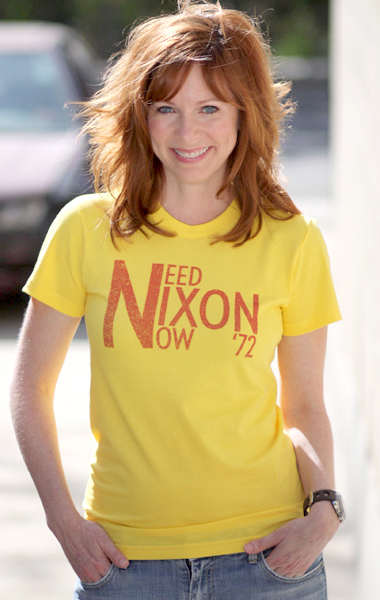Richard Nixon's
supporters in 1972 urged voters to vote
for their man with many different campaign
buttons, like the one upon which our
design in based. We print this classic
Nixon slogan in red, on a 100% cotton
yellow tee, available in unisex and a
woman's version.
|
|

Click image to see larger
graphic. |

Click image to see larger
graphic. |
Womens 100% Fine Jersey Cotton
T-Shirt

$19.99
|
Unisex 100% Fine Jersey Cotton
T-Shirt

$19.99
|
|
|
|

|
|

 The greatest honor history can
bestow is the title of
peacemaker.
The greatest honor history can
bestow is the title of
peacemaker. 
Inaugural address (January 20,
1969); later used as Nixon's
epitaph.
Richard Nixon (January 9, 1913 -
April 22, 1994) rose from
congressman to senator to vice
president between the years of
1946 and 1952 - then withdrew
from politics altogether
following a loss in the 1962
election for governor of
California. He would reemerge as
the GOP contender in the 1968
presidential election, ultimately
winning the presidency.
 Isn't it better to talk about the
relative merits of washing
machines than the relative
strength of rockets?
Isn't it better to talk about the
relative merits of washing
machines than the relative
strength of rockets?
Isn't this the kind of
competition you want? 
Remarks to Soviet premier
Nikita Krushchev during the
Kitchen Debate.
July 24, 1959
While
Nixon's path to the 1972 GOP
re-nomination was relatively
smooth, his Democratic
challenger, South Dakota senator
George McGovern, accepted the
party's nomination after a long
and brutal primary season.
 Certainly
in the next 50 years we shall see
a woman President--maybe sooner
than you think. Certainly
in the next 50 years we shall see
a woman President--maybe sooner
than you think.
Remarks at a Reception
Commemorating the 50th
Anniversary of the League of
Women Voters of the United
States.
April 17, 1969
|
Initially,
Senator Ted Kennedy was
expected to seek (and
likely win) the
Democratic nomination,
but he opted to sit out
the election following
the Chappaquiddick
scandal. During the
primary season, McGovern
faced Maine senator
Edmund Muskie (whose
campaign was derailed by
a bizarre combination of
fabrications and
rumors), New York
Representative Shirley
Chisholm (the first
major-party
African-American to make
a run for the
presidency) and
pro-segregation Alabama
Governor George Wallace
(victim of an
assassination attempt
during the campaign),
among many other
contenders vying for the
nomination.
|
 I gave them a sword, and
they stuck it in and
they twisted it with
relish.
I gave them a sword, and
they stuck it in and
they twisted it with
relish.
And I guess if I had
been in their position,
I'd have done the same
thing. 
David Frost's
interview with Richard
Nixon, broadcast in May
1977
|
|
McGovern,
a liberal, anti-war
progressive, saw his
campaign rocked by
revelations that his
running mate, Thomas
Eagleton, had been
treated for a mental
illness. McGovern might
have mitigated the
fallout had he not
quickly shifted from
full support of Eagleton
to then jettisoning him
in favor of John F.
Kennedy's brother-in-law
Sargent Shriver.
Ultimately, Nixon would
be re-elected by a
landslide.
|
 No
event in American
history is more
misunderstood than the
Vietnam War. No
event in American
history is more
misunderstood than the
Vietnam War.
It was misreported then,
and it is misremembered
now. 
No More
Vietnams by Richard
Nixon (1985)
|
|
Two years
into his second term,
facing probable
impeachment for his role
in the Watergate
cover-up, Nixon resigned
from the presidency.
Though pardoned by his
successor, Gerald Ford,
it would take years for
the tarnish of the
scandal to diminish, and
for Americans to be able
to focus on the
accomplishments of his
administration,
including introduction
of the Clean Air Act and
creation of the EPA,
abolishing the draft,
negotiating nuclear
weaponry agreements with
the Soviet Union,
opening diplomatic talks
with China and, of
course, ending the
Vietnam War. |
|
|
|
|
|
|





















